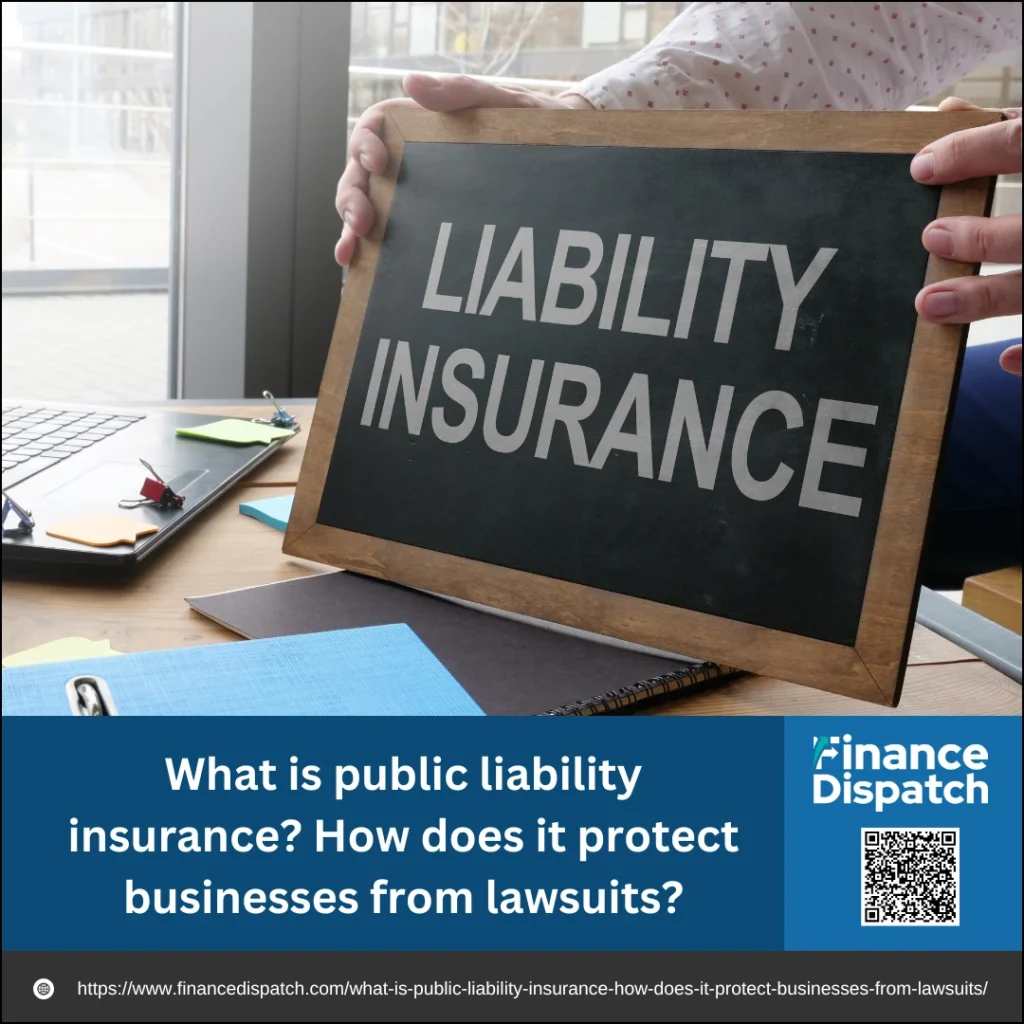Running a business comes with many responsibilities, and one of the biggest risks is facing lawsuits due to accidents or damages involving customers, clients, or the general public. Whether it’s a customer slipping on a wet floor, a contractor accidentally damaging a client’s property, or a visitor getting injured on your premises, these incidents can lead to expensive legal battles and compensation claims. This is where public liability insurance plays a crucial role. It acts as a financial safeguard, covering legal costs and potential payouts if your business is held liable for third-party injuries or property damage. While not legally required in many cases, having this insurance can provide businesses with peace of mind, ensuring they can operate without the looming threat of unexpected lawsuits. In this article, we’ll explore what public liability insurance is, why it’s essential, and how it helps protect businesses from costly legal claims.
What is Public Liability Insurance?
Public liability insurance is a type of business insurance that provides financial protection against claims made by third parties for injuries or property damage caused by business activities. Whether you run a retail store, an office, a construction business, or any service-oriented company, accidents can happen—such as a customer slipping on a wet floor or a contractor damaging a client’s property during a project. If your business is found liable, public liability insurance covers the legal costs, medical expenses, and compensation claims, preventing a financial burden that could otherwise disrupt operations. Although not always a legal requirement, it is highly recommended for businesses that interact with the public, as it ensures stability and safeguards against unexpected lawsuits.
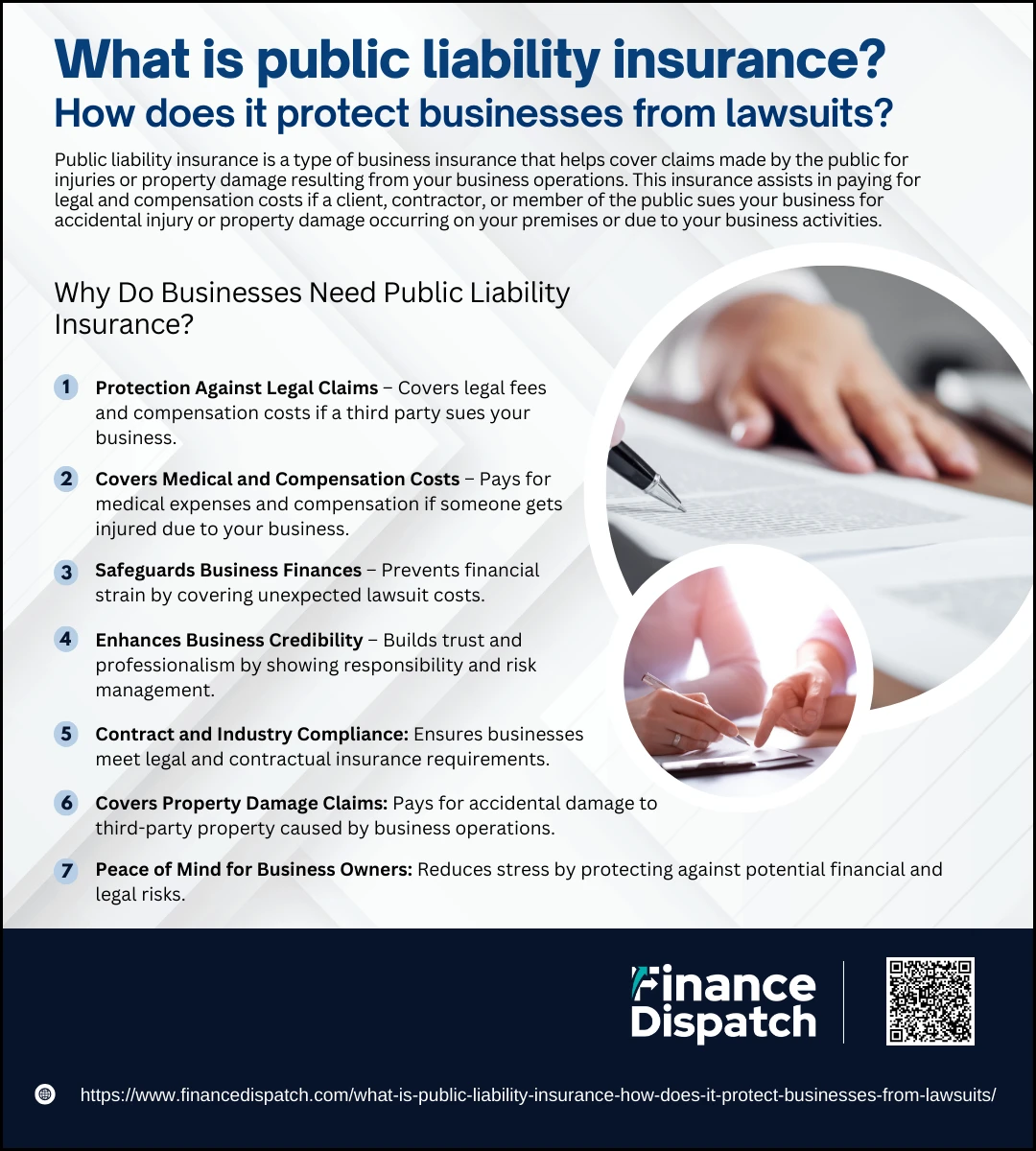 Why Do Businesses Need Public Liability Insurance?
Why Do Businesses Need Public Liability Insurance?
Running a business comes with various risks, especially when dealing with customers, suppliers, or the general public. Accidents can happen unexpectedly, and even a minor incident can result in a legal claim that could cost thousands of dollars. Public liability insurance provides a financial safety net, ensuring that businesses are protected from third-party injury or property damage claims. Whether you own a retail store, a construction company, or a service-based business, having this insurance helps safeguard your operations from unforeseen legal and financial burdens. Below are some crucial reasons why businesses should consider public liability insurance.
1. Protection Against Legal Claims
Businesses can face lawsuits if someone is injured on their premises or due to their operations. Legal fees, court settlements, and compensation costs can be overwhelming, especially for small businesses. Public liability insurance covers these expenses, reducing the financial burden and allowing businesses to defend themselves effectively in legal disputes.
2. Covers Medical and Compensation Costs
If a customer or third party gets injured at your business location or due to your services, you may be required to cover their medical expenses. For example, if a customer slips on a wet floor in a store and fractures a bone, public liability insurance ensures that the medical bills and any compensation claims are covered.
3. Safeguards Business Finances
A single lawsuit can be financially devastating, potentially draining a business’s resources or even leading to bankruptcy. Public liability insurance acts as a buffer against such unexpected costs, ensuring that businesses can continue operating without severe financial strain.
4. Enhances Business Credibility
Clients, customers, and business partners often prefer working with companies that have proper insurance coverage. Having public liability insurance demonstrates professionalism and responsibility, making your business more attractive to potential clients and partners. Some industries even require proof of insurance before signing contracts.
5. Contract and Industry Compliance
In some industries, having public liability insurance is mandatory. Many landlords, government agencies, and corporate clients require businesses to carry insurance before they can sign a lease, bid on a project, or enter into a contract. Without the necessary coverage, businesses might miss out on valuable opportunities.
6. Covers Property Damage Claims
Businesses that operate in customers’ homes, offices, or public spaces risk causing accidental property damage. For example, if a plumber accidentally floods a customer’s house or an electrician damages an expensive fixture, public liability insurance covers the repair or replacement costs.
7. Peace of Mind for Business Owners
Running a business is stressful enough without worrying about potential lawsuits and financial liabilities. Public liability insurance provides peace of mind, knowing that your business is protected against claims that could arise from everyday operations. This allows business owners to focus on growth and success without constant fear of unexpected legal issues.
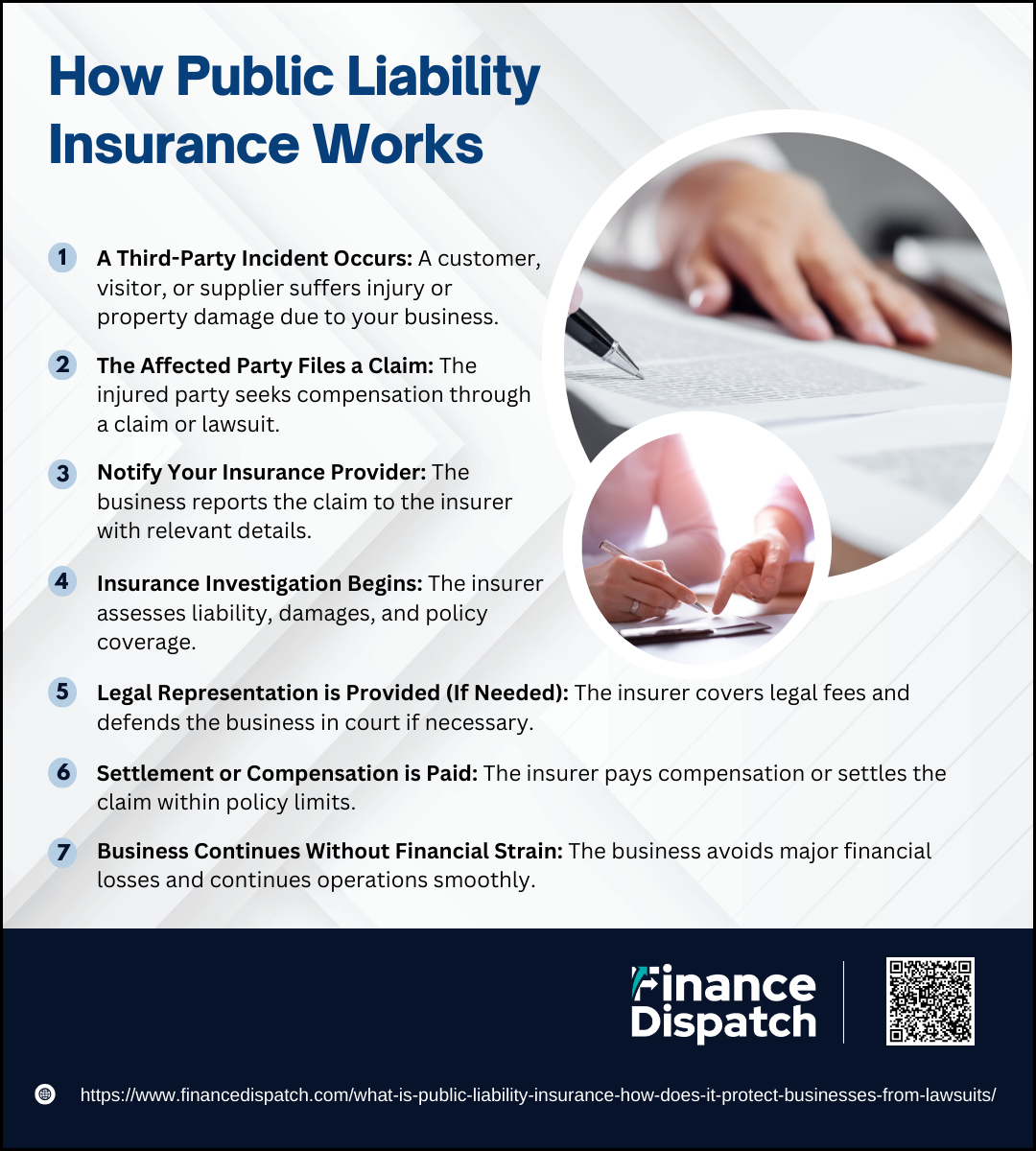 How Public Liability Insurance Works
How Public Liability Insurance Works
No matter how careful a business is, accidents can happen at any time, leading to legal claims from customers, clients, or visitors. A simple mistake—such as a customer slipping on a wet floor, a contractor damaging a client’s property, or a delivery person getting injured at your premises—can result in expensive lawsuits. Public liability insurance acts as a safety net by covering legal costs, medical expenses, and compensation payouts related to third-party injuries or property damage. Understanding how this insurance works helps business owners stay prepared and avoid financial disruptions. Below is a step-by-step breakdown of how public liability insurance functions in real-world scenarios.
1. A Third-Party Incident Occurs
A person who is not an employee—such as a customer, supplier, or visitor—suffers an injury or experiences property damage due to your business operations. Common examples include:
- A customer tripping over loose flooring in a store and breaking their wrist.
- A contractor accidentally breaking a client’s window while working on-site.
- A visitor to your office getting injured due to falling equipment.
2. The Affected Party Files a Claim
Once an incident occurs, the injured party may file a legal claim against your business. They can demand compensation for medical expenses, lost wages, property damage, or emotional distress. In some cases, they might try to settle the claim directly with your business, while in others, they may take legal action through the courts.
3. Notify Your Insurance Provider
As soon as a claim is made, you must inform your insurance company. The insurer will request incident details, including:
- The date, time, and location of the incident.
- Statements from witnesses or employees who were present.
- Photos or videos of the accident site (if available).
- Copies of medical reports (if applicable).
- Timely notification is crucial, as delays could impact the claim process.
4. Insurance Investigation Begins
The insurance company assigns a claims adjuster to investigate the claim. They will assess:
- Whether your business was at fault for the incident.
- The extent of the injuries or property damage.
- Whether the claim falls within the coverage of your policy.
- During this process, the insurer may contact the affected party, request additional documentation, or conduct site inspections.
5. Legal Representation is Provided (If Needed)
If the claim escalates into a lawsuit, your insurance provider covers legal fees, including attorney costs and court expenses. The insurer may attempt to resolve the dispute through settlement negotiations, avoiding a lengthy trial. If the case goes to court, they will defend your business against the allegations.
6. Settlement or Compensation is Paid
Once liability is determined, the insurance provider will either:
- Settle the claim out of court by paying the affected party an agreed-upon amount.
- Proceed with a court case, where a judge decides the outcome.
- If the business is found responsible, the insurer covers compensation payments, including medical costs, repair expenses, and any other damages awarded, up to the policy’s coverage limit.
7. Business Continues Without Financial Strain
Without public liability insurance, a single lawsuit could put a business at risk of financial collapse. By covering these unexpected costs, the insurance allows businesses to continue operations smoothly without major financial setbacks. This protection is particularly vital for small and medium-sized businesses that may not have the funds to cover legal claims on their own.
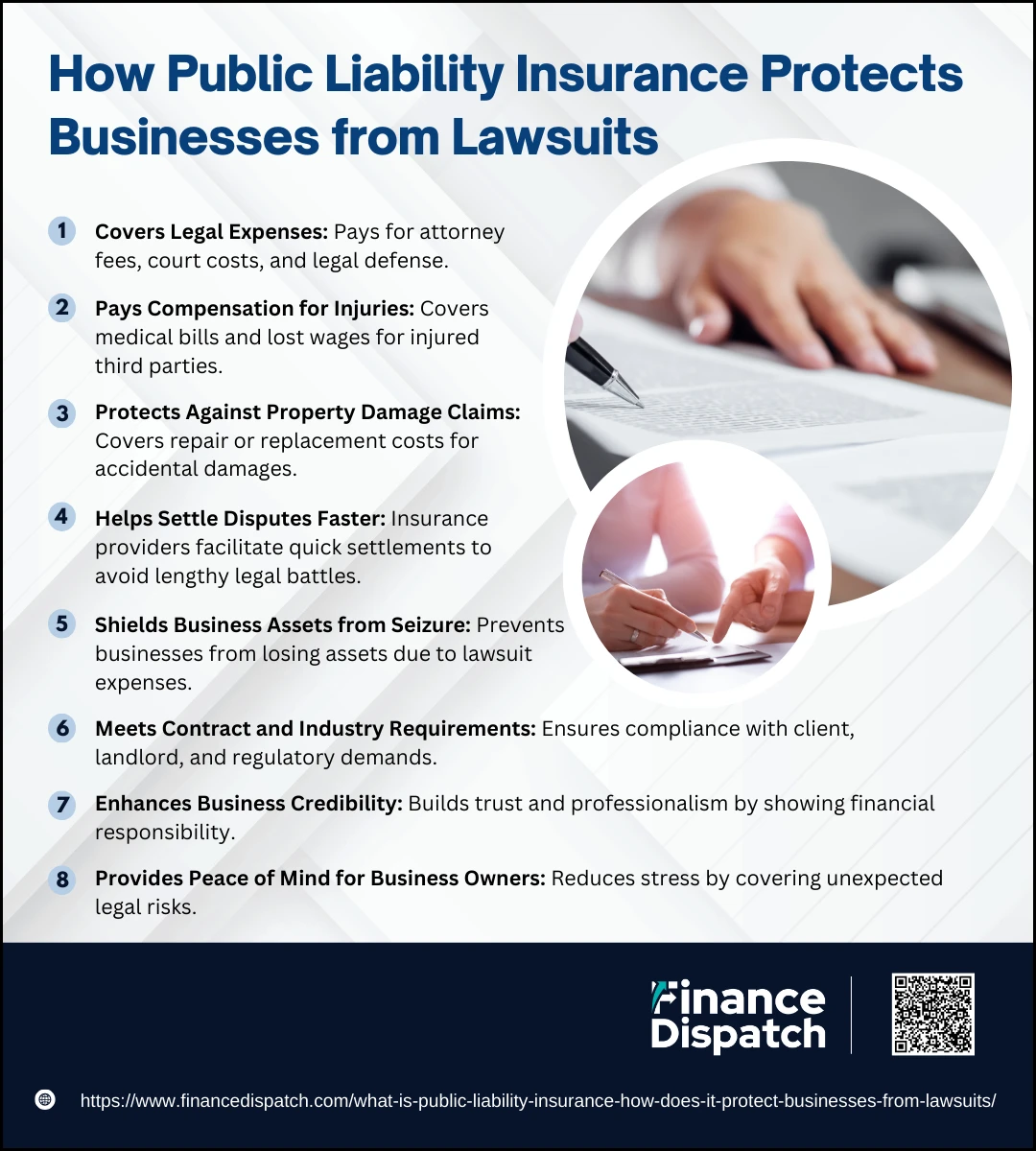 How Public Liability Insurance Protects Businesses from Lawsuits
How Public Liability Insurance Protects Businesses from Lawsuits
No business is immune to accidents or unexpected incidents that could lead to legal claims. A simple mishap—like a customer slipping on a wet floor, a contractor accidentally damaging a client’s property, or a visitor getting injured on your premises—can quickly escalate into a costly lawsuit. Public liability insurance provides businesses with financial protection by covering legal fees, medical expenses, and compensation payouts if a third party sues for injury or property damage. Without this coverage, businesses could face significant financial strain or even closure due to expensive lawsuits. Below are some key ways public liability insurance helps safeguard businesses from legal claims.
1. Covers Legal Expenses
Lawsuits can be costly, even if a business is not found liable. Public liability insurance covers attorney fees, court costs, and other legal expenses, ensuring businesses can defend themselves without depleting their finances.
2. Pays Compensation for Injuries
If a customer, visitor, or client suffers an injury on your business premises or due to your services, they may demand compensation for medical treatment, rehabilitation, or lost wages. Public liability insurance covers these expenses, preventing out-of-pocket costs for the business.
3. Protects Against Property Damage Claims
Businesses that operate on clients’ properties—such as contractors, cleaners, or repair services—risk causing accidental damage. If a business is held liable for damaging a third party’s property, public liability insurance covers the repair or replacement costs.
4. Helps Settle Disputes Faster
Legal battles can be lengthy and disrupt business operations. Insurance providers often work to settle valid claims quickly, avoiding prolonged legal disputes that could harm the company’s reputation and productivity.
5. Shields Business Assets from Seizure
Without insurance, businesses may need to use their savings or sell assets to cover lawsuit expenses. Public liability insurance ensures that a legal claim does not put the company’s financial stability at risk.
6. Meets Contract and Industry Requirements
Many clients, landlords, and industry regulations require businesses to have public liability insurance before entering agreements. Having this coverage ensures compliance and allows businesses to secure more contracts and opportunities.
7. Enhances Business Credibility
Businesses with public liability insurance appear more professional and trustworthy to clients and customers. It reassures them that they are dealing with a responsible company that takes risk management seriously.
8. Provides Peace of Mind for Business Owners
Running a business comes with enough challenges without worrying about unexpected lawsuits. Public liability insurance allows business owners to focus on growth and operations without fear of legal threats.
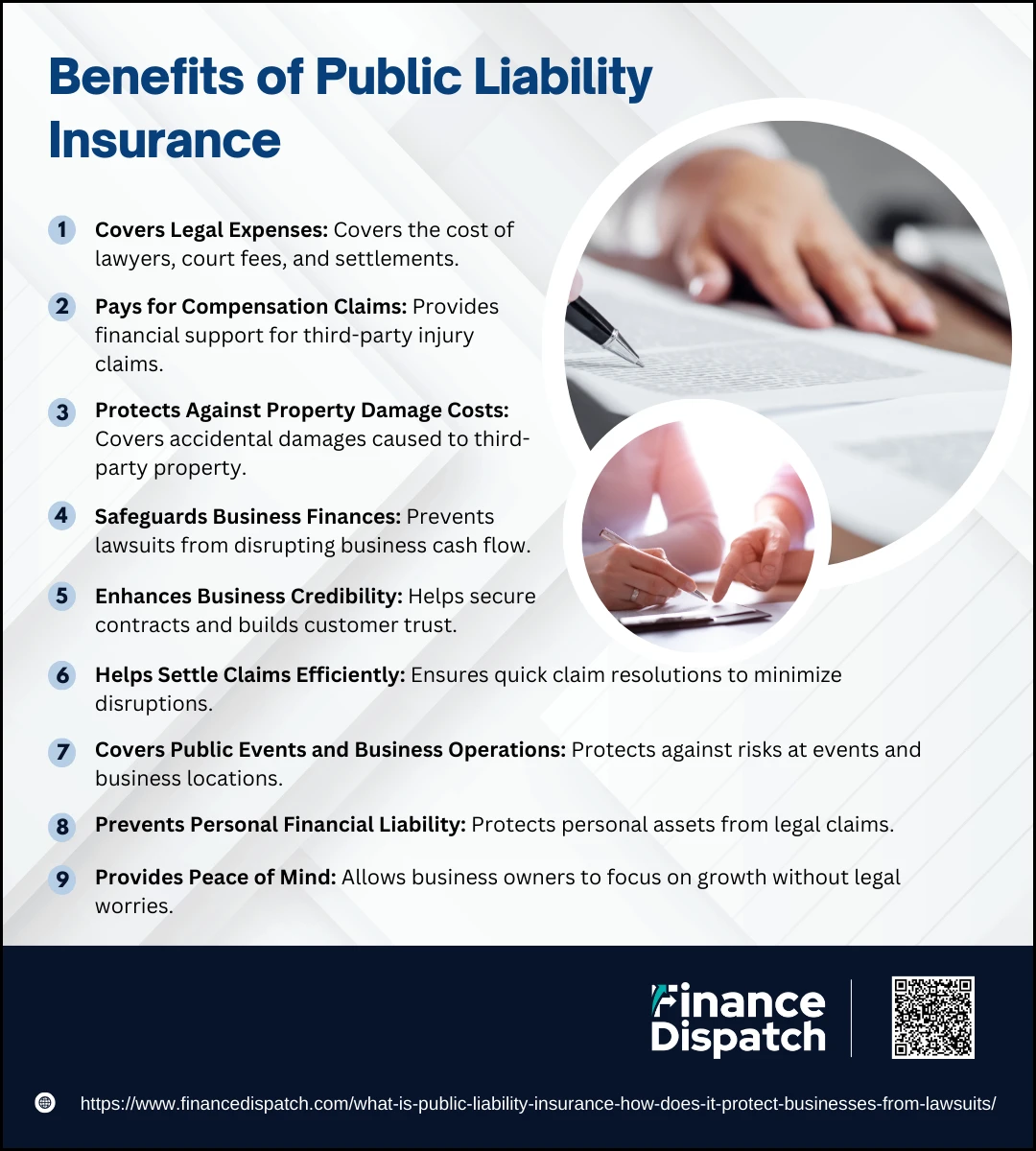 Benefits of Public Liability Insurance
Benefits of Public Liability Insurance
Running a business involves various risks, especially when dealing with customers, suppliers, or the public. Even with the best safety measures in place, accidents can happen—whether it’s a customer slipping in a store, a contractor damaging a client’s property, or an unexpected legal dispute. Public liability insurance helps businesses manage these risks by covering legal costs, compensation claims, and medical expenses arising from third-party injuries or property damage. While not always legally required, it provides essential financial protection and business credibility. Below are the key benefits of having public liability insurance.
1. Covers Legal Expenses
If your business is sued, legal fees can quickly add up. Public liability insurance covers the costs of hiring a lawyer, court proceedings, and settlement negotiations, ensuring you don’t have to bear the financial burden alone.
2. Pays for Compensation Claims
When a third party—such as a customer, supplier, or visitor—suffers an injury due to your business operations, they may seek compensation. Public liability insurance helps cover medical expenses, rehabilitation costs, and lost income for the affected individual.
3. Protects Against Property Damage Costs
If your business accidentally causes damage to someone else’s property—such as a contractor breaking a client’s window—public liability insurance covers repair or replacement costs, preventing financial loss.
4. Safeguards Business Finances
A single lawsuit can be financially devastating, especially for small businesses. Public liability insurance acts as a safety net, preventing unexpected claims from disrupting your cash flow or forcing you to shut down operations.
5. Enhances Business Credibility
Many clients, landlords, and industry regulators require businesses to have public liability insurance before signing contracts. Having this coverage demonstrates professionalism and reassures customers that your business takes responsibility for potential risks.
6. Helps Settle Claims Efficiently
Legal disputes can take months or even years to resolve, impacting business operations. Insurance providers handle claims efficiently, negotiating settlements to prevent prolonged legal battles that could harm your company’s reputation and productivity.
7. Covers Public Events and Business Operations
If your business organizes events, hosts customers at a physical location, or operates in public spaces, public liability insurance ensures you’re protected against potential incidents, such as injuries or property damage at these events.
8. Prevents Personal Financial Liability
For sole traders and small business owners, an uninsured lawsuit could mean paying out of pocket or selling personal assets to cover claims. Public liability insurance ensures that your personal finances remain protected.
9. Provides Peace of Mind
Running a business is stressful enough without worrying about potential lawsuits. Knowing you have coverage in place allows you to focus on growth and operations without the constant fear of unexpected legal claims.
What Does Public Liability Insurance Cover?
Public liability insurance provides financial protection for businesses by covering legal claims from third parties who suffer injuries or property damage due to business operations. Whether you run a retail store, a construction company, or a service-based business, accidents can happen unexpectedly. A customer might slip on a wet floor, a contractor might damage a client’s property, or a visitor could get injured at your premises. In such cases, public liability insurance helps cover medical expenses, repair costs, legal fees, and compensation claims. Below is a detailed breakdown of what public liability insurance covers.
Coverage Details of Public Liability Insurance
| Coverage Type | Description |
| Bodily Injury | Covers medical expenses, hospital bills, and compensation for third-party injuries that occur on business premises or due to business activities. |
| Property Damage | Pays for repair or replacement costs if the business is responsible for damaging a third party’s property. |
| Legal Fees | Covers costs associated with hiring lawyers, court fees, settlements, and other legal expenses if a lawsuit is filed against the business. |
| Compensation Claims | Covers financial compensation awarded to third parties for injury or property damage caused by business operations. |
| Public Event Liability | Provides coverage for accidents or injuries that occur during business-hosted events or public gatherings. |
| Product-Related Incidents | Some policies extend coverage to product liability if a business’s product causes harm or damage to customers. |
| Accidents on Customer’s Property | Covers accidental damages or injuries caused by business operations at a client’s home or workplace. |
| Emergency Medical Costs | Covers first-aid and emergency medical treatment required immediately after an accident involving a third party. |
What Are the Limitations of Public Liability Insurance?
While public liability insurance provides essential protection for businesses against third-party injury and property damage claims, it does not cover every possible risk. Many business owners assume that having this insurance means they are fully protected from all legal liabilities, but there are important limitations to be aware of. Public liability insurance primarily covers incidents involving the public, but it excludes claims related to employee injuries, professional negligence, or intentional misconduct. Understanding these limitations helps businesses take additional precautions and consider other types of insurance for full coverage. Below are the key limitations of public liability insurance.
Key Limitations of Public Liability Insurance
- Employee Injuries Not Covered – Public liability insurance does not cover workplace injuries sustained by employees. Businesses need workers’ compensation insurance to protect employees.
- Professional Errors and Negligence Excluded – If a business makes a mistake in its services or advice that causes financial loss to a client, public liability insurance does not apply. Professional indemnity insurance is required for such claims.
- Damage to Own Business Property – Any damage to the business’s own premises, equipment, or inventory is not covered. Commercial property insurance is needed for such risks.
- Contractual Liabilities May Be Excluded – Some policies do not cover liabilities arising from specific contractual agreements. Businesses should carefully review contract terms and insurance requirements.
- Intentional or Criminal Acts Not Covered – If an injury or property damage is caused intentionally or through illegal activities, the insurer will not provide coverage.
- Product Liability May Require Separate Coverage – Some public liability policies do not cover claims related to defective products causing harm. Businesses dealing with physical products should consider product liability insurance separately.
- Pollution and Environmental Damage Excluded – Accidents causing pollution or environmental harm, such as chemical spills, are generally not covered unless a specific rider is added to the policy.
- Limited Coverage for Certain High-Risk Industries – Businesses involved in hazardous work, such as construction or manufacturing, may require additional coverage, as public liability insurance alone may not be sufficient.
- Fines, Penalties, and Punitive Damages Are Not Covered – If a court imposes fines or punitive damages due to gross negligence, the insurance will not cover these costs.
How Much Does Public Liability Insurance Cost?
The cost of public liability insurance varies depending on several factors, including the type of business, industry risks, location, and coverage limits. Businesses with a higher likelihood of third-party injuries or property damage—such as construction companies or retail stores—typically pay more than lower-risk businesses like consulting firms. While small businesses might pay a modest premium, larger businesses with extensive public interactions may face higher costs. Understanding what influences the cost of public liability insurance helps business owners choose the right policy for their needs and budget. Below are the key factors that determine the price of public liability insurance.
Factors Affecting the Cost of Public Liability Insurance
- Type of Business – Businesses with higher public interaction, such as retail stores, restaurants, and contractors, typically pay more than those with minimal public exposure, like freelancers or consultants.
- Industry Risk Level – Industries with a higher risk of accidents—such as construction, manufacturing, or event planning—have higher premiums due to the increased likelihood of claims.
- Business Size and Revenue – Larger businesses with higher annual revenue and more customers may face higher premiums as they have a greater risk exposure.
- Location of Business Operations – Businesses operating in areas with strict regulations or high accident rates may pay more for coverage.
- Coverage Limits – Policies with higher coverage limits (e.g., $1 million vs. $10 million) cost more but provide greater financial protection against claims.
- Claims History – Businesses with a history of frequent claims may face higher premiums as insurers see them as a higher risk.
- Number of Employees – While public liability insurance does not cover employee injuries, insurers may consider workforce size when determining the overall risk of third-party interactions.
- Policy Inclusions and Exclusions – Some policies include additional protections, such as product liability, which may increase costs, while exclusions can lower premiums.
- Payment Structure – Some insurers offer lower rates for annual payments compared to monthly installments.
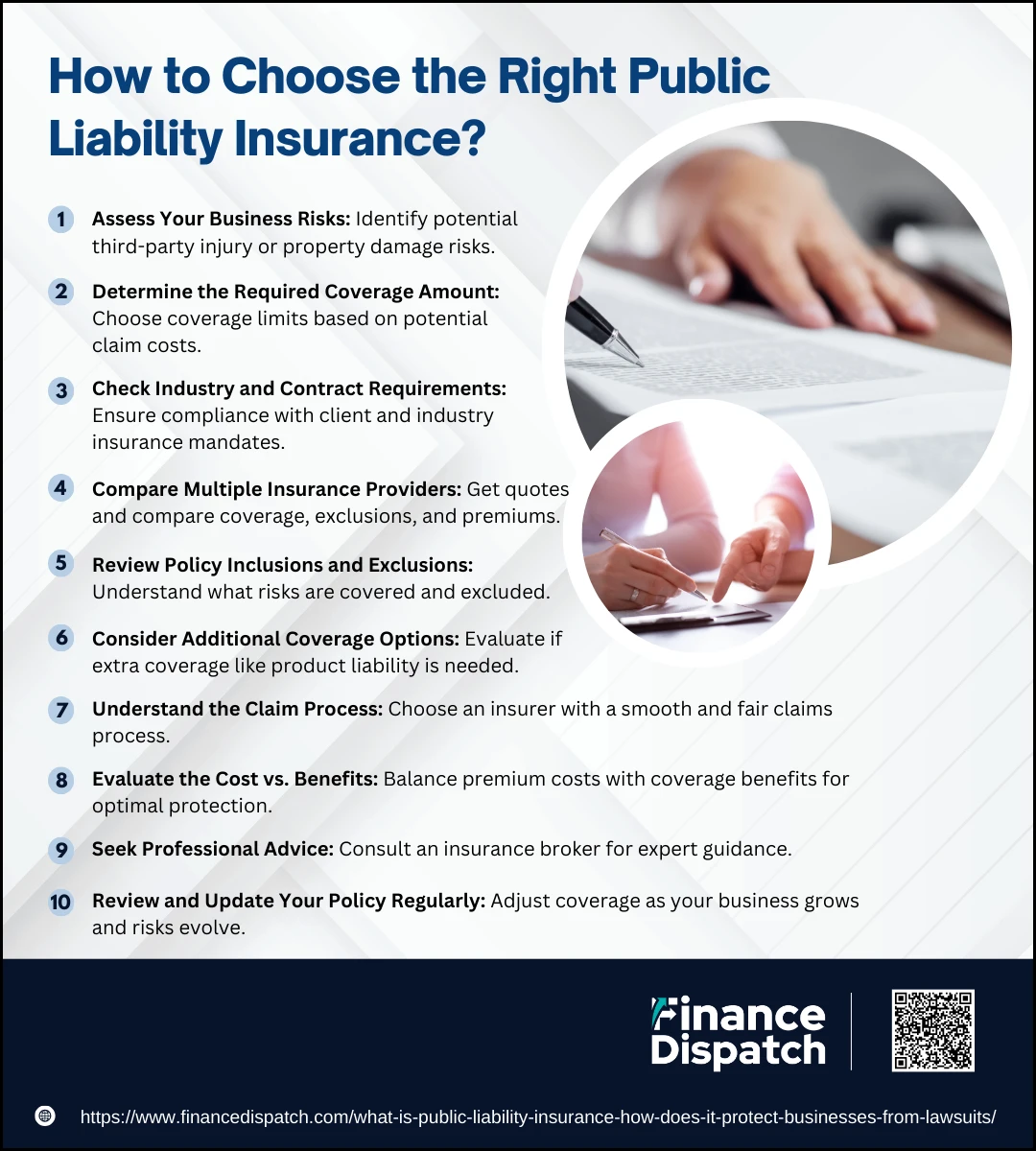 How to Choose the Right Public Liability Insurance?
How to Choose the Right Public Liability Insurance?
Selecting the right public liability insurance is crucial for protecting your business against unexpected legal claims from third parties. With different policies offering varying levels of coverage, it’s important to assess your business’s risks and insurance needs before making a decision. Factors such as industry risks, coverage limits, and policy exclusions can significantly impact the effectiveness of your insurance. To ensure you get the best coverage for your business, follow these essential steps when choosing a public liability insurance policy.
1. Assess Your Business Risks
Every business has unique risks based on its industry and operations. Consider the likelihood of third-party injuries or property damage. For example, a construction company has a higher risk than an online consultant, so coverage needs will differ.
2. Determine the Required Coverage Amount
Public liability insurance policies offer different coverage limits, typically ranging from $1 million to $10 million. Higher coverage limits provide greater financial protection but come with higher premiums. Assess how much coverage your business may need based on potential claim costs.
3. Check Industry and Contract Requirements
Some industries and clients require businesses to have public liability insurance before signing contracts. If your business provides services to government agencies, landlords, or corporate clients, verify if they have specific insurance requirements.
4. Compare Multiple Insurance Providers
Different insurers offer different coverage options and pricing. Obtain quotes from multiple insurance providers and compare the coverage, exclusions, and premiums to find the best value for your business.
5. Review Policy Inclusions and Exclusions
Read the fine print of the insurance policy to understand what is covered and what is not. Some policies exclude certain risks, such as intentional damages, employee injuries, or product liability. Ensure the policy covers your primary business risks.
6. Consider Additional Coverage Options
Public liability insurance may not cover all risks your business faces. Depending on your industry, you may need additional coverage such as:
- Professional indemnity insurance – Protects against claims due to professional errors.
- Product liability insurance – Covers claims related to defective products.
- Workers’ compensation insurance – Covers employee injuries.
7. Understand the Claim Process
A smooth and efficient claim process is essential for businesses. Choose an insurer with a reputation for quick and fair claim settlements. Read reviews and check customer experiences before selecting a policy.
8. Evaluate the Cost vs. Benefits
While affordability is important, choosing the cheapest policy may not always provide adequate coverage. Balance the cost of premiums with the benefits offered to ensure you get comprehensive protection at a reasonable price.
9. Seek Professional Advice
If you are unsure about which policy to choose, consult an insurance broker or expert who can help you understand the best options for your business based on industry standards and risk factors.
10. Review and Update Your Policy Regularly
As your business grows, your risks may change. Regularly review your insurance policy to ensure it still meets your needs, and update coverage when necessary to avoid gaps in protection.
How to File a Claim Under Public Liability Insurance
If your business faces a claim due to a third-party injury or property damage, knowing how to properly file a public liability insurance claim can make the process smoother and ensure timely compensation. Whether it’s a customer slipping in your store, a contractor accidentally damaging a client’s property, or an injury occurring at a business event, handling the claim efficiently is crucial. Filing a claim requires gathering necessary evidence, notifying your insurer promptly, and cooperating with the investigation. Below are the key steps to follow when filing a public liability insurance claim.
Steps to File a Public Liability Insurance Claim
- Notify Your Insurance Provider Immediately – As soon as an incident occurs that may lead to a claim, inform your insurer. Delays in reporting could complicate the claim process.
- Document the Incident – Gather all necessary details, including the date, time, location, and nature of the accident. Take photographs or videos of the scene and any damages or injuries.
- Obtain Witness Statements – If there were any witnesses, collect their statements and contact details to support your claim. Their testimony can provide crucial evidence.
- Keep Medical and Repair Records – If the claim involves an injury, ensure medical reports, hospital bills, or doctor’s notes are documented. For property damage claims, obtain repair estimates or invoices.
- Complete the Claim Form – Your insurer will provide a claim form that needs to be filled out accurately. Provide detailed information about the incident and attach supporting documents.
- Cooperate with the Insurance Investigation – The insurance company may assign an adjuster to assess the claim. Provide them with all necessary documents and assist in their inquiries.
- Avoid Admitting Liability Prematurely – Do not accept fault or make promises of compensation before consulting with your insurer. Let the insurance company handle the legal aspects.
- Follow Up on the Claim Process – Stay in touch with your insurance provider to track the claim’s progress. Be proactive in providing any additional information if requested.
- Negotiate Settlement if Necessary – If a settlement is offered, review it carefully. Your insurer will usually handle negotiations, but if needed, seek legal advice before accepting an offer.
- Receive Claim Payout – Once the claim is approved, the insurer will cover the agreed-upon costs, including legal fees, medical expenses, or property repairs, based on your policy’s coverage limits.
Common Myths About Public Liability Insurance
Public liability insurance is essential for businesses that interact with customers, suppliers, or the general public. However, many business owners misunderstand how this insurance works, leading to misconceptions that could leave them financially vulnerable. Some believe it’s only necessary for high-risk industries, while others assume it covers all business-related liabilities. These myths can result in businesses being underinsured or having false expectations about coverage. Below, we debunk some of the most common myths about public liability insurance.
Myth #1: Only Large Businesses Need Public Liability Insurance
- Many small businesses and sole traders assume they don’t need coverage. However, even a single claim for injury or property damage can lead to costly legal expenses.
Myth #2: It Covers All Business Liabilities
- Public liability insurance only covers third-party injury and property damage claims. It does not cover employee injuries, professional mistakes, or damage to business property—other insurance policies are needed for those risks.
Myth #3: Public Liability Insurance is Legally Required
- Unlike workers’ compensation, public liability insurance is not legally mandated in most regions. However, many landlords, clients, and industry regulators require businesses to have it before signing contracts.
Myth #4: It Covers Employee Injuries
- Public liability insurance does not cover workplace injuries suffered by employees. Businesses need workers’ compensation insurance to protect employees.
Myth #5: Only High-Risk Industries Need Coverage
- While construction and manufacturing businesses have higher risks, accidents can happen in any industry, including retail, consulting, and hospitality. A simple slip-and-fall accident in an office can lead to a costly lawsuit.
Myth #6: You Don’t Need It if You Work from Home
- Even home-based businesses face risks, such as a client visiting and getting injured on your property. Many home insurance policies do not cover business-related liabilities.
Myth #7: Public Liability Insurance is Too Expensive
- The cost of public liability insurance varies based on industry and coverage limits. Many policies are affordable, especially when compared to the potential financial impact of a lawsuit.
Myth #8: If You Are Careful, You Won’t Need It
- No matter how careful a business is, accidents and unforeseen incidents can happen. Even if your business follows all safety regulations, you can still be sued, and legal costs alone can be financially devastating.
Conclusion
Public liability insurance is a crucial safeguard for businesses, protecting them from financial losses due to third-party injury and property damage claims. Despite common misconceptions, this insurance is not just for large or high-risk businesses—accidents can happen in any industry, and even a single lawsuit can have severe financial consequences. Understanding what public liability insurance covers, its limitations, and the factors that influence its cost helps businesses make informed decisions about their coverage. Whether you run a small home-based business or a large company, having the right policy ensures financial security, business credibility, and peace of mind. Investing in public liability insurance is not just a protective measure—it’s a smart business decision that helps secure long-term success.



